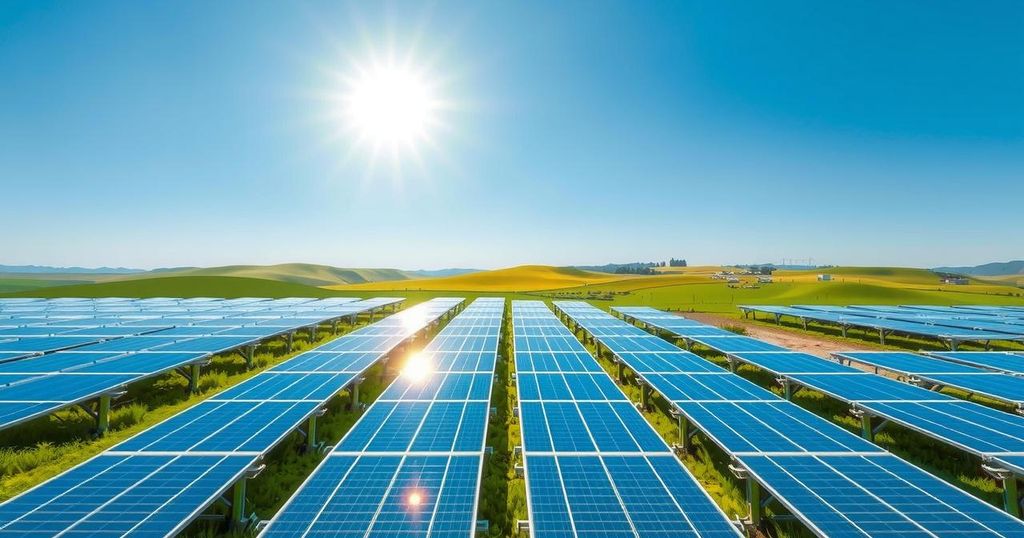Corruption Case Against Adani Unveils India’s Solar Sector Vulnerabilities
A U.S. corruption case involving Gautam Adani has exposed vulnerabilities in India’s solar sector, hindering its transition to clean energy. Allegations of bribery and financial inefficiencies plague the industry, complicating India’s ambitious renewable energy goals amid concerns of regulatory failures and competition disadvantages with imported components.
The recent corruption case involving Indian billionaire Gautam Adani has revealed significant weaknesses in India’s burgeoning solar energy sector. The allegations suggest that Adani’s company concealed involvement in a bribery plot linked to a major solar initiative. This case underscores systemic hurdles that hinder India’s transition to clean energy and its efforts to combat climate change.
Adani Group has denied the allegations from U.S. authorities, which claim that the company misled investors regarding a scheme worth $265 million tied to their projects. This unfolding scandal may impact not just the company’s operations, but also highlight the structural issues in India’s renewable energy landscape. The suspension of the Foreign Corrupt Practices Act by the Trump administration created a brief optimism regarding the resolution of these allegations.
Despite its potential, the solar sector in India is grappling with financial difficulties. State-owned electricity companies, facing accumulated losses exceeding $7.8 billion, struggle to incentivize clean energy investments due to budgetary constraints and inefficiencies. Experts indicate that these financial roadblocks impede the broader adoption of renewable energy despite its comparative cost advantages over coal.
The Solar Energy Corporation of India (SECI) was established to mitigate the financial uncertainties experienced by state utilities caused by the rising costs and inefficiencies of solar energy projects. However, allegations against the Adani Group suggest that reliance on these state utilities can complicate the procurement process, leading to increased costs rather than the intended efficiencies.
Moreover, India’s restrictive import policies on solar components raise domestic production costs. The country’s output has increased significantly, yet its growth in rooftop solar installations remains stagnant compared to its targets. This limitation hampers market competition, as large corporations like Adani can dominate due to their ability to manufacture essential components.
The ongoing scrutiny of Adani’s business practices sheds light on potential regulatory inadequacies and cronyism within the Indian energy sector. Although the majority of government tenders are executed transparently, occasional poorly advertised projects contribute to reduced market competition, further complicating progress in the renewable sector.
As India’s population continues to grow—and its electricity demand is projected to rise—moving towards cleaner energy sources becomes increasingly urgent. The current solar capacity growth is accompanied by a disconnection between production and consumption, with a large share of solar installations remaining unutilized due to a lack of storage and insufficient demand from utilities. This situation calls for the implementation of more robust solutions to ensure that India’s renewable energy transition does not stall, as it remains crucial for addressing both energy needs and climate change mitigation.
China’s dominance in solar panel manufacturing has amplified India’s challenges in becoming competitive on a global scale. Despite ambitious goals set for solar energy, India has not yet fully capitalized on the available technologies needed to boost its renewable output. Experts warn that the combination of ongoing scandals and structural challenges threatens the sustainability of India’s renewable energy aspirations.
The allegations against Gautam Adani spotlight significant challenges within India’s solar energy sector, including financial inefficiencies, regulatory weaknesses, and comparative disadvantages in manufacturing. As India seeks to bolster its renewable energy infrastructure, addressing these issues will be essential to ensure a sustainable transition away from fossil fuels in order to meet the escalating electricity demands of its growing population.
Original Source: www.independent.co.uk




Post Comment